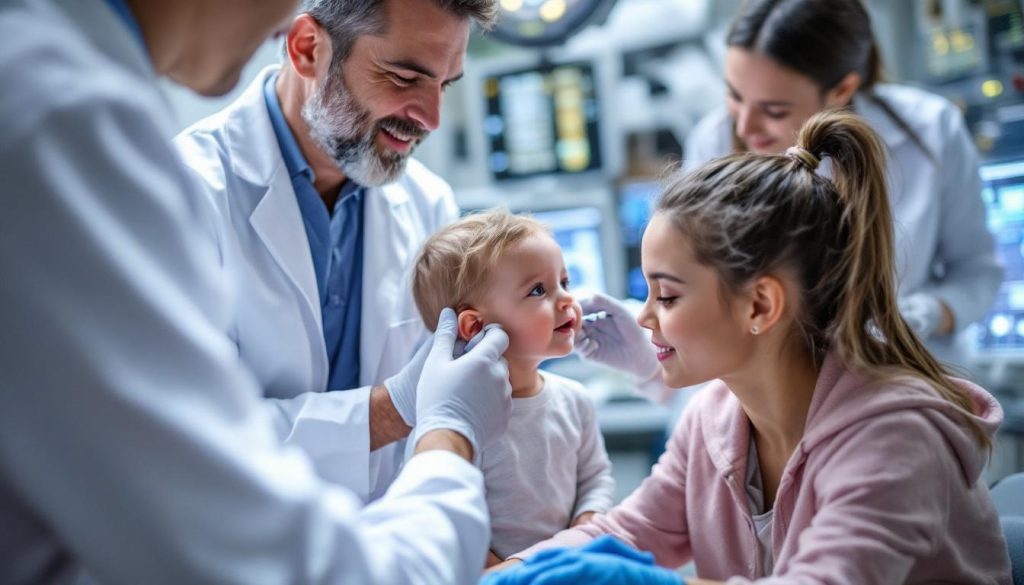For the first time in medical history, a team of scientists has successfully restored hearing to people born with congenital deafness using an innovative gene therapy. This pioneering treatment, conducted across five hospitals in China, involved ten patients aged between 1 and 24 years who suffer from a rare form of deafness caused by mutations in the OTOF gene. This gene mutation impairs the transmission of sound signals from the ear to the brain, leading to severe hearing loss.
The gene therapy was administered as a single injection directly into the cochlea of the patients, using a synthetic adeno-associated virus (AAV) to deliver a healthy version of the gene. Remarkably, hearing improvements began to appear within a month, with all participants showing significant gains after six months. Their hearing thresholds improved dramatically from an average of 106 decibels—comparable to the noise of a motorcycle—down to 52 decibels, closer to the sound of rainfall.
Dr. Maoli Duan, a co-author of the study, highlighted the significance of the therapy being effective even in adolescents and adults, not just young children. He described the treatment as well-tolerated, reporting no serious side effects during a year of follow-up. The research team now aims to conduct larger clinical trials and closely monitor how long these hearing improvements last.
This achievement represents a monumental step forward for patients with this specific genetic form of deafness and ushers in hope for thousands worldwide affected by similar conditions. The clinical trial was detailed in a paper titled “AAV1-hOTOF Gene Therapy for Autosomal Recessive Deafness 9: a single-arm trial,” published in the prestigious medical journal The Lancet. It was a collaborative effort involving the Eye and ENT Hospital of Fudan University and international partners, including Harvard Medical School.
Building on these promising results, researchers are now exploring gene therapies for other more common genetic causes of deafness, such as those linked to the GJB2 and TMC1 genes. These conditions present greater complexity, but animal model experiments have shown encouraging progress, raising hopes that a broader spectrum of hereditary hearing loss might be treatable in the future.
Additional global research has mirrored these outcomes. An experimental gene therapy has yielded similar success in restoring hearing to children with inherited deafness in multiple locations, including Philadelphia and various sites in China. These therapies typically restore hearing to around 60-70% of normal levels, and importantly, with few reported adverse effects. However, this line of treatment has also sparked ethical discussions within the deaf community, concerning the cultural and personal implications of “curing” deafness.
More recently, a clinical trial in Shanghai notably broke new ground by successfully treating children in both ears simultaneously, rather than unilaterally. The five children in this study not only regained hearing but also showed improved ability to locate sounds and enhanced speech perception in noisy environments—a vital aspect for communication. The trial employed a minimally invasive, microscopic injection technique, underscoring the therapy’s safety and precision.
Pharmaceutical companies are also advancing this field. Regeneron Pharmaceuticals recently announced positive results from their gene therapy trials that included children as young as 10 months old. Their work demonstrates improvements to near-normal hearing in most speech-relevant frequencies, reinforcing the growing body of evidence that gene therapy can be a transformative approach for congenital deafness.
Although the current clinical trials remain relatively small, their outcomes point towards a future where gene therapy could become a standard option for many with hereditary deafness. The scientific community is eager to expand these studies internationally and to explore longer-term effects, while also addressing the complex ethical dimensions that accompany such groundbreaking advancements.
📌 Reference Map:
- Paragraph 1 – [1], [4]
- Paragraph 2 – [1], [2], [5]
- Paragraph 3 – [1], [4], [7]
- Paragraph 4 – [1], [4]
- Paragraph 5 – [2], [4]
- Paragraph 6 – [3], [6]
- Paragraph 7 – [5]
- Paragraph 8 – [1], [2], [3], [5]
Source: Noah Wire Services

